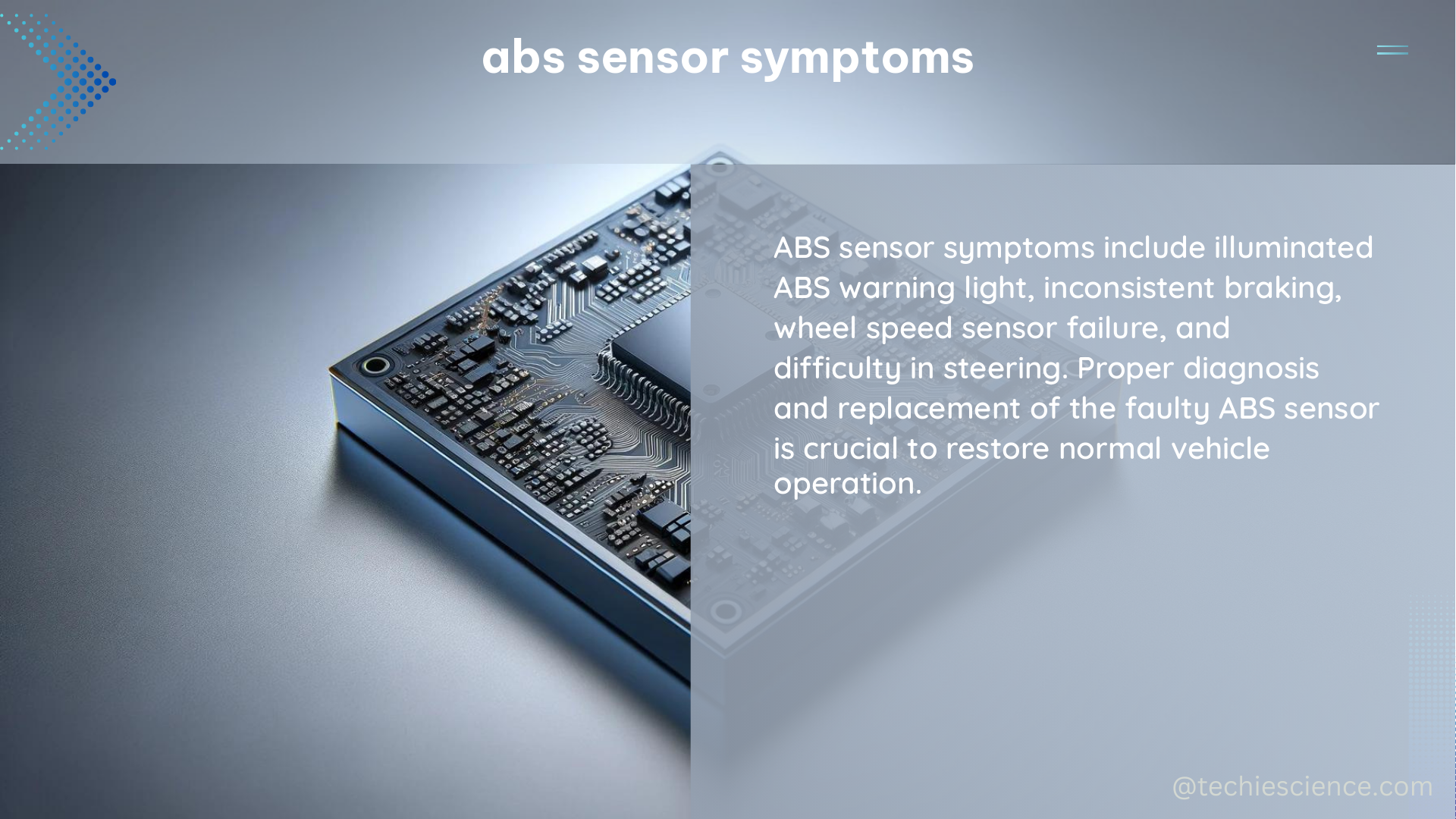The anti-lock braking system (ABS) is a crucial safety feature in modern vehicles, and the ABS sensor, also known as the wheel speed sensor, plays a vital role in its operation. This sensor monitors the speed of each wheel and transmits this information to the ABS control module, which uses it to prevent the wheels from locking up during hard braking, ensuring the vehicle’s stability and control.
Understanding the ABS Sensor
The ABS sensor is typically located near the wheel hub, where it can accurately detect the rotational speed of the wheel. It can be designed as either an active or passive sensor, with active sensors requiring a separate power supply from the control unit, while passive sensors do not.
One common type of passive ABS sensor is the inductive-passive sensor, which generates a quantifiable alternating voltage in the winding when the magnetic field changes due to the rotation of the impulse wheel. This voltage is then transmitted to the control unit as a signal.
Symptoms of a Faulty ABS Sensor

When the ABS sensor is not functioning correctly, it can lead to a variety of symptoms that can affect the vehicle’s performance and safety. Here are some of the most common ABS sensor symptoms:
1. ABS Warning Light Illumination
One of the most obvious signs of an ABS sensor issue is the illumination of the ABS warning light on the dashboard. This light may flash briefly when the vehicle is started, but if it stays on, it could indicate a problem with the ABS system, including a faulty wheel speed sensor.
2. Unresponsive ABS
If the ABS sensor is not working properly, the ABS control module will not receive any data about the wheel speed, causing the entire anti-lock braking system to shut down. This can be dangerous, as it leaves the wheels at risk of locking up during hard braking.
3. Traction and Stability Control Issues
Traction and stability control systems rely on data from the wheel speed sensors to function properly. If the sensors are not working, these systems will shut down, which can affect the vehicle’s handling and stability.
4. Speedometer Failure
In some cases, a faulty ABS sensor may also cause the speedometer to fail. This is because some vehicles use the wheel speed sensors to provide speed information to the instrument cluster.
Diagnosing a Faulty ABS Sensor
To diagnose a faulty ABS sensor, a mechanic will typically use a diagnostic tool to check the signal from the sensor. If the signal is not within the specified range, the sensor may need to be replaced.
It is important to note that when replacing an ABS sensor, it is often recommended to replace all four wheel speed sensors at the same time. This ensures consistent performance and helps to avoid having to replace the sensors again in the near future.
Technical Specifications of ABS Sensors
As mentioned earlier, ABS sensors can be designed as either active or passive. Here are some additional technical specifications to consider:
Active ABS Sensors
- Require a separate power supply from the control unit
- Typically use a Hall effect or magnetoresistive principle to detect wheel speed
- Generate a digital signal that is sent to the control unit
Passive ABS Sensors
- Do not require a separate power supply
- Commonly use an inductive-passive design, generating an alternating voltage in the winding when the magnetic field changes due to wheel rotation
- Transmit the voltage signal to the control unit
Conclusion
The ABS sensor is a critical component of the anti-lock braking system, and understanding the symptoms of a faulty sensor is essential for maintaining the safety and performance of your vehicle. By being aware of the potential issues and having a qualified mechanic diagnose and replace the sensor if necessary, you can ensure your vehicle’s braking system is functioning correctly and keep yourself and your passengers safe on the road.
References:
– ABS Sensor Symptoms and Troubleshooting
– Wheel Speed Sensor Symptoms
– ABS and Brake Disc Information
– Symptoms of a Bad Wheel Speed Sensor
– Checking and Changing the ABS Sensor

The lambdageeks.com Core SME Team is a group of experienced subject matter experts from diverse scientific and technical fields including Physics, Chemistry, Technology,Electronics & Electrical Engineering, Automotive, Mechanical Engineering. Our team collaborates to create high-quality, well-researched articles on a wide range of science and technology topics for the lambdageeks.com website.
All Our Senior SME are having more than 7 Years of experience in the respective fields . They are either Working Industry Professionals or assocaited With different Universities. Refer Our Authors Page to get to know About our Core SMEs.